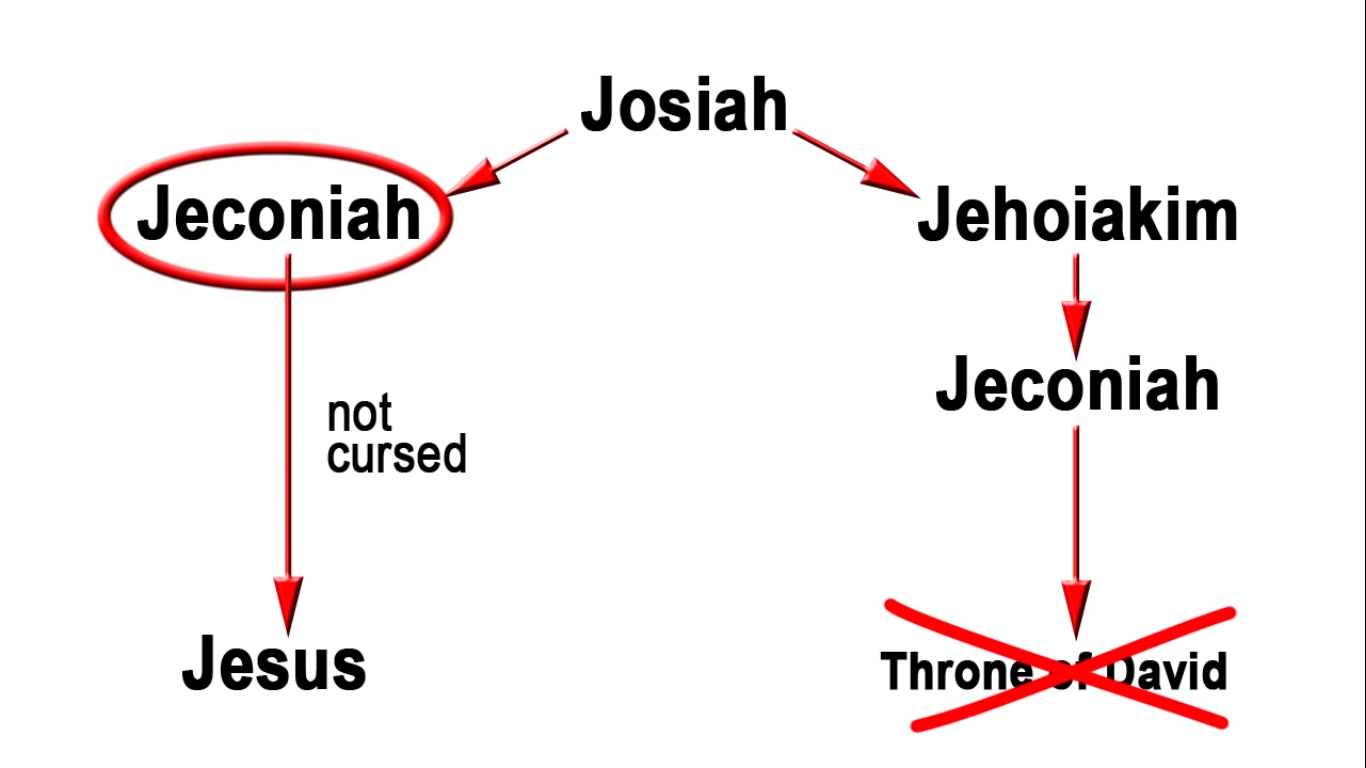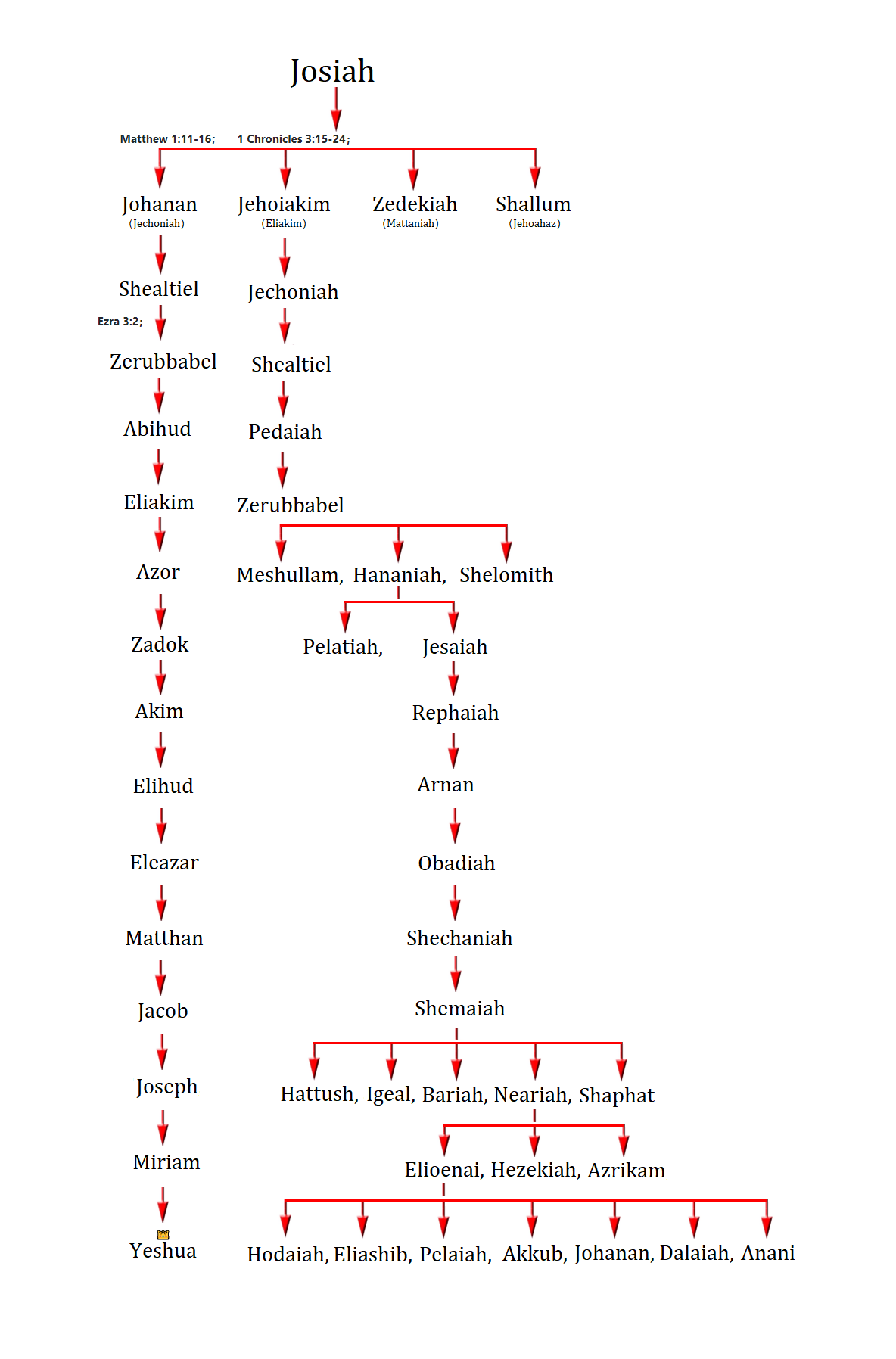The Bible indicate that the curse on Jeconiah was reversed or lifted because of his repentance. Zerubbabel is the grandson of Jeconiah.
Since no descendant of Jeconiah could ever sit on the throne (Jeremiah 22:24 and 22:30), if Jesus is a descendant of this cursed king, he is disqualified from being the Messiah.
If true, then what is Jeconiah doing in the genealogy of Jesus in Matthew's gospel? And how can Jesus qualify to be the Messiah? First of all, we have to wonder why Matthew would ever have included Jeconiah among the ancestors of Jesus if this so obviously disqualified Jesus from being the Messiah. In fact, the Scripture shows that the curse was only short-term, if not altogether reversed by God.
There are three parts to the curse on Jeconiah (who is also called Jehoiachin or Coniah):
- that he would be childless (this is how the Hebrew text literally
reads)
- that he would not prosper in his lifetime
- that none of his descendants would rule in Judah
The Scripture shows that in fact none of these took place.
Though the Hebrew literally reads, "Record this man childless," Jeconiah in fact had children.
The descendants of Jehoiachin the captive: Shealtiel his son, Malkiram, Pedaiah, Shenazzar, Jekamiah, Hoshama and Nedabiah
-- 1 Chronicles 3:17-18
He did prosper in his day.
In the thirty-seventh year of the exile of Jehoiachin king of Judah, in the year Evil-Merodach became king of Babylon, he released Jehoiachin from prison on the twenty-seventh day of the twelfth month. He spoke kindly to him and gave him a seat of honour higher than those of the other kings who were with him in Babylon.
-- 2 Kings 25:27-28
His grandson Zerubbabel prospered and ruled. In fact the same words God used in rejecting Jeconiah were deliberately used in establishing Zerubbabel.
"As surely as I live," declares the LORD, "even if you, Jehoiachin son of Jehoiakim king of Judah, were a signet ring on my right hand, I would still pull you off.
-- Jeremiah 22:24
"'On that day,' declares the LORD Almighty, 'I will take you, my servant Zerubbabel son of Shealtiel,' declares the LORD, 'and I will make you like my signet ring, for I have chosen you,' declares the LORD Almighty."
-- Haggai 2:23
Though Zerubbabel did not sit on the throne as king, the fact that Haggai 2:23 uses the same terminology as Jeremiah 22:24 shows that Haggai intended to indicate a reversal of the curse.
We have to conclude that in Jeremiah 22:30, "in his lifetime" qualifies the following phrases, and "for" explains that no descendant of his will prosper and rule during his lifetime.
We find ample rabbinic sources which also agree that God reversed the curse on Jeconiah, which they attribute to repentance on Jeconiah's part. We even find the idea that the Messiah will descend from Jeconiah--exactly the opposite of what some say is impossible! I am quoting just a few from the article: JewsforJesus The Jeconiah Problem:
1. Sources stating that Jeconiah repented and so God reversed the curse.
Sanhedrin 37b-38a
R. Johanan said: Exile atones for everything,
for it is written, Thus saith the Lord, write ye this man childless, a
man that shall not prosper in his days, for no man of his seed shall
prosper sitting upon the throne of David and ruling any more in Judah.
Whereas after he [the king] was exiled, it is written, And the sons of
Jechoniah, -- the same is Assir -- Shealtiel his son etc.(1) [He was
called] Assir, because his mother conceived him in prison. Shealtiel,
because God did not plant him in the way that others are planted. We
know by tradition that a woman cannot conceive in a standing position.
[yet she] did conceive standing. Another interpretation: Shealtiel,
because God obtained [of the Heavenly court] absolution from His
oath.(2)
(1) I Ch. III, 17. Notwithstanding the curse that he should be
childless and not prosper, after being exiled he was forgiven. (2)
Which He had made, to punish Jechoniah with childlessness.
--Soncino Talmud edition, with selected footnotes
2. Sources stating that the Messiah will descend from Jeconiah.
- Tanhuma Genesis, Toledot (8th-9th c.)
Scripture alludes here to the verse Who art thou, O great mountain
before Zerubbabel? Thou shalt become a plain (Zech. 4:7). This verse
refers to the Messiah, the descendant of David. . . .From whom will
the Messiah descend? From Zerubbabel.
Midrash Tanhuma-Yelammedenu, translated by Samuel A. Berman
(Hoboken, NJ: Ktav, 1996), p. 182.
- Rabbi A. J. Rosenberg on Jeremiah 22:24 (20th c.)
Malbim calls to our attention that in the prophecy of Haggai (2:23),
God says, "On that day I will take you, Zerubbabel, and I will make
you like a signet," for the King Messiah will be like a signet ring on
God's right hand, so to speak. Just as the name of the owner of the
ring is engraved on his signet ring, through which he makes himself
known, so will God's name be known in the world through the King
Messiah, through whom His miracles will be known. He says here that,
though, in the future, Coniah will be the signet on My right hand, for
the Messiah will spring from his seed, now I will remove him from
there.
--Ibid., p. 183. Malbim is an acronym for Meir Loeb ben Jehiel Michale, a 19th c. rabbi and commentator. 22:24.
Jehoiachin's sad experiences changed his nature entirely, and as he
repented of the sins which he had committed as king he was pardoned by
God, who revoked the decree to the effect that none of his descendants
should ever become king (Jer. xxii.30; Pesik., ed. Buber, xxv. 163a,
b): he even became the ancestor of the Messiah (Tan., Toledot, 20 [ed.
Buber, i. 140]).
--Louis Ginzberg, "Jehoiachin," vol. 7 p. 84.

